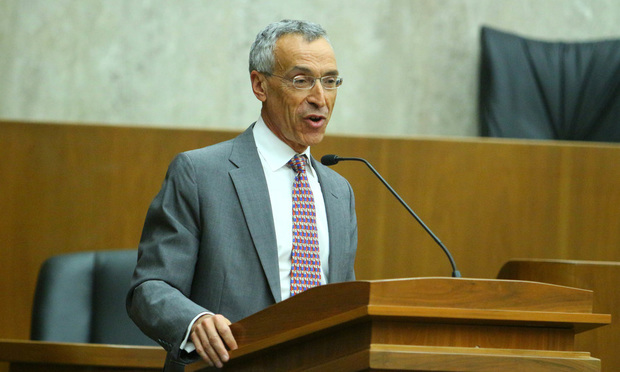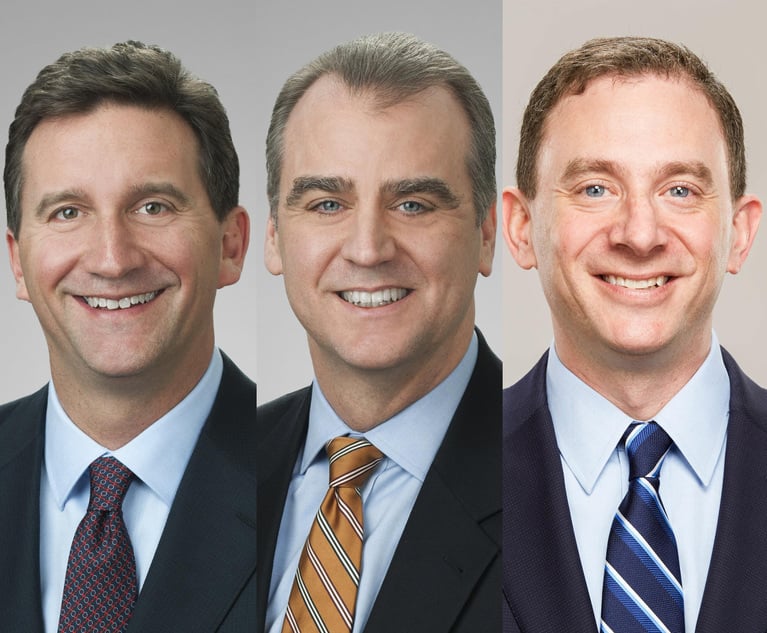Monsanto Asks 9th Circuit to Reverse First Federal Roundup Verdict
The March 27 verdict, for plaintiff Edwin Hardeman, defied "regulatory judgment" and "sound science," Monsanto's lawyers wrote in their brief before the U.S. Court of Appeals for the Ninth Circuit.
December 16, 2019 at 03:03 PM
4 minute read
The original version of this story was published on The Recorder
 Seth Waxman.
Seth Waxman.
Monsanto Co. has asked a federal appeals court to reverse a verdict over its herbicide Roundup that it said "defies both expert regulatory judgment and sound science."
In a Dec. 13 brief, former U.S. Solicitor General Seth Waxman and other lawyers for Monsanto, owned by Bayer AG, asked the U.S. Court of Appeals for the Ninth Circuit to reverse the $80 million verdict, later reduced to $25.3 million. They cited federal preemption, "serious legal errors" on causation, and a lack of Monsanto's alleged "reprehensible conduct" justifying punitive damages. The trial, according to Monsanto, was the first in federal court, where 5,000 Roundup lawsuits are pending.
"This appeal has the potential to shape how every subsequent Roundup case is litigated," wrote Monsanto's legal team, led by Waxman, of Wilmer Cutler Pickering Hale and Dorr in Washington, D.C. "That verdict defies both expert regulatory judgment and sound science."
Joining Waxman on the brief were firm partner Paul Wolfson, also in Washington, D.C., as well as former U.S. Homeland Security Department general counsel Philip Perry and Richard Bress, both at Latham & Watkins in Washington, D.C.
Covington & Burling, Bryan Cave Leighton Paisner and Wilkinson Walsh + Eskovitz, which represented Monsanto at trial, also had lawyers on the brief.
Jennifer Moore, of Moore Law Group in Louisville, Kentucky, and Aimee Wagstaff, of Andrus Wagstaff of Lakewood, Colorado, who represented the plaintiff, Edwin Hardeman, did not respond to a request for comment. Leslie Brueckner, a senior attorney at Public Justice, who joined the plaintiff's legal team this month, also did not respond.
Hardeman's March 27 verdict was the second to find that Roundup caused someone to get non-Hodgkin lymphoma. A previous jury, in San Francisco Superior Court, had awarded $289 million, later reduced to $78 million, and jurors in Alameda County Superior Court awarded $2 billion to a California couple May 13.
In Hardeman's case, U.S. District Judge Vince Chhabria of the Northern District of California refused to toss the award, including punitive damages, citing Monsanto's "reprehensible" conduct. But he lowered punitive damages, which he considered "constitutionally impermissible," to a 4:1 ratio to Hardeman's compensatory damages.
That still was unjustified, Monsanto's lawyers wrote in their Ninth Circuit brief, particularly given that the scientific literature when Hardeman was diagnosed in 2015 found that Roundup ingredient glyphosate did not cause cancer in humans.
Monsanto also continued to insist that Chhabria should have allowed it to introduce the conclusions of not just the U.S. Environmental Protection Agency, which found glyphosate to be safe, but those of numerous regulatory agencies around the world. Plaintiffs lawyers had relied on the 2015 decision by International Agency for Research on Cancer, which classified glyphosate as a carcinogen.
"Even though expert regulatory agencies worldwide, including the EPA, have concluded that glyphosate does not cause cancer, and even though no scientific studies have yielded reliable evidence of such causation, the district court allowed the jury to return a massive verdict against Monsanto," Monsanto's lawyers wrote.
Monsanto also argued that the Federal Insecticide, Fungicide, and Rodenticide Act preempted Hardeman's claims. Citing the U.S. Supreme Court's decisions in Wyeth v. Levine and Merck Sharp & Dohme v. Albrecht, its lawyers argued that Monsanto could not have warned consumers about Roundup's alleged cancer risks, even if it wanted to, because there was "clear evidence" that the EPA would have rejected such a label change.
It also challenged Chhabria's rulings allowing plaintiff's causation experts, who "cherry-picked data from flawed studies," and his jury instructions relating to causation.
"Hardeman's suit should never have gone to the jury because his expert opinions on the central issue in the case—whether glyphosate caused Hardeman's illness—should not have been admitted," Monsanto's lawyers wrote.
This content has been archived. It is available through our partners, LexisNexis® and Bloomberg Law.
To view this content, please continue to their sites.
Not a Lexis Subscriber?
Subscribe Now
Not a Bloomberg Law Subscriber?
Subscribe Now
NOT FOR REPRINT
© 2025 ALM Global, LLC, All Rights Reserved. Request academic re-use from www.copyright.com. All other uses, submit a request to [email protected]. For more information visit Asset & Logo Licensing.
You Might Like
View All
Litigators of the Week: A Knockout Blow to Latest FCC Net Neutrality Rules After ‘Loper Bright’

Litigators of the (Past) Week: Defending Against a $290M Claim and Scoring a $116M Win in Drug Patent Fight
Law Firms Mentioned
Trending Stories
- 1'It's Not Going to Be Pretty': PayPal, Capital One Face Novel Class Actions Over 'Poaching' Commissions Owed Influencers
- 211th Circuit Rejects Trump's Emergency Request as DOJ Prepares to Release Special Counsel's Final Report
- 3Supreme Court Takes Up Challenge to ACA Task Force
- 4'Tragedy of Unspeakable Proportions:' Could Edison, DWP, Face Lawsuits Over LA Wildfires?
- 5Meta Pulls Plug on DEI Programs
Who Got The Work
Michael G. Bongiorno, Andrew Scott Dulberg and Elizabeth E. Driscoll from Wilmer Cutler Pickering Hale and Dorr have stepped in to represent Symbotic Inc., an A.I.-enabled technology platform that focuses on increasing supply chain efficiency, and other defendants in a pending shareholder derivative lawsuit. The case, filed Oct. 2 in Massachusetts District Court by the Brown Law Firm on behalf of Stephen Austen, accuses certain officers and directors of misleading investors in regard to Symbotic's potential for margin growth by failing to disclose that the company was not equipped to timely deploy its systems or manage expenses through project delays. The case, assigned to U.S. District Judge Nathaniel M. Gorton, is 1:24-cv-12522, Austen v. Cohen et al.
Who Got The Work
Edmund Polubinski and Marie Killmond of Davis Polk & Wardwell have entered appearances for data platform software development company MongoDB and other defendants in a pending shareholder derivative lawsuit. The action, filed Oct. 7 in New York Southern District Court by the Brown Law Firm, accuses the company's directors and/or officers of falsely expressing confidence in the company’s restructuring of its sales incentive plan and downplaying the severity of decreases in its upfront commitments. The case is 1:24-cv-07594, Roy v. Ittycheria et al.
Who Got The Work
Amy O. Bruchs and Kurt F. Ellison of Michael Best & Friedrich have entered appearances for Epic Systems Corp. in a pending employment discrimination lawsuit. The suit was filed Sept. 7 in Wisconsin Western District Court by Levine Eisberner LLC and Siri & Glimstad on behalf of a project manager who claims that he was wrongfully terminated after applying for a religious exemption to the defendant's COVID-19 vaccine mandate. The case, assigned to U.S. Magistrate Judge Anita Marie Boor, is 3:24-cv-00630, Secker, Nathan v. Epic Systems Corporation.
Who Got The Work
David X. Sullivan, Thomas J. Finn and Gregory A. Hall from McCarter & English have entered appearances for Sunrun Installation Services in a pending civil rights lawsuit. The complaint was filed Sept. 4 in Connecticut District Court by attorney Robert M. Berke on behalf of former employee George Edward Steins, who was arrested and charged with employing an unregistered home improvement salesperson. The complaint alleges that had Sunrun informed the Connecticut Department of Consumer Protection that the plaintiff's employment had ended in 2017 and that he no longer held Sunrun's home improvement contractor license, he would not have been hit with charges, which were dismissed in May 2024. The case, assigned to U.S. District Judge Jeffrey A. Meyer, is 3:24-cv-01423, Steins v. Sunrun, Inc. et al.
Who Got The Work
Greenberg Traurig shareholder Joshua L. Raskin has entered an appearance for boohoo.com UK Ltd. in a pending patent infringement lawsuit. The suit, filed Sept. 3 in Texas Eastern District Court by Rozier Hardt McDonough on behalf of Alto Dynamics, asserts five patents related to an online shopping platform. The case, assigned to U.S. District Judge Rodney Gilstrap, is 2:24-cv-00719, Alto Dynamics, LLC v. boohoo.com UK Limited.
Featured Firms
Law Offices of Gary Martin Hays & Associates, P.C.
(470) 294-1674
Law Offices of Mark E. Salomone
(857) 444-6468
Smith & Hassler
(713) 739-1250








